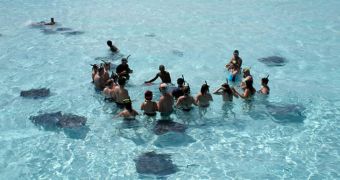Ecotourism might have its upsides (eg. it helps greenheads raise some of the money they need in order to roll out conservation projects), yet a new study suggests that it can sometimes prove detrimental to wildlife.
Not to beat about the bush, it appears that the stingrays in a rather popular ecotourism site, i.e. Stingray City/Sandbar in the Cayman Islands, have been spending so much time interacting with humans that they have developed new behavioral patterns.
Thus, not only do they not shy away from people as they are supposed to, but they also seem ready and willing to feed during daytime. Moreover, they don't mind swimming around others of their kind.
Wildlife researchers explain that wild stingrays are solitary creatures that mostly feed during nighttime.
Therefore, the peculiar behavior displayed by the stingrays living in the waters off the Cayman Islands can only be attributed to their interacting with humans.
“We saw some very clear and very prominent behavioral changes, and were surprised by how these large animals had essentially become homebodies in a tiny area,” study co-author Mahmood Shivji told members of the press.

 14 DAY TRIAL //
14 DAY TRIAL //